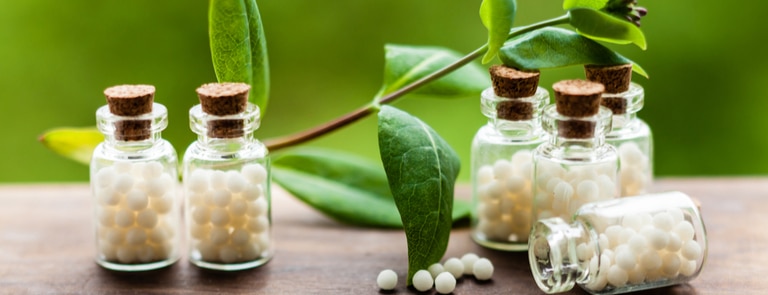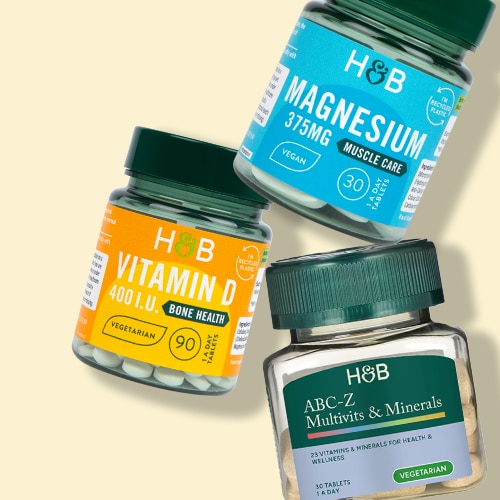15% off €25
5 of the best homeopathic remedies

Homeopathy is a form of complementary medicine that’s used as an alternative treatment for certain health conditions.
It’s the second largest system of medicine in the world. Over 200 million people use homeopathic remedies worldwide.1
Prince Charles is believed to be a user of homeopathy and the Queen is patron of the Royal London Hospital for Integrated Medicine (formerly the London Homoeopathic Hospital).2 Meanwhile, homeopathic remedies are reportedly used by lots of sports stars and celebrities, including David Beckham, Jennifer Aniston and Sir Paul McCartney.
As well as a high profile following, homeopathy has an extensive history that goes way back to more than two centuries ago. However, despite being so established and its widespread use, homeopathy still continues to be classed as an alternative approach to mainstream medicine.
While extensive research may have been carried out on the effects of homeopathic medicine over the years, most reports have been found to be either flawed, biased or not based on scientific evidence.3
What is homeopathy in simple terms?
There are so many different explanations of homeopathy out there, but we’ve settled on this one, from the Society of Homeopaths, which we think sums it up nicely:
‘Homeopathy is a holistic medicine which uses specially prepared, highly diluted substances (given mainly in tablet form) with the aim of triggering the body’s own healing mechanisms.’
For example:
Somebody who has hay fever may benefit from the homeopathic remedy Allium Cepa (onion) because it produces similar symptoms, such as watery eyes or runny nose.
Now, for the more detailed bit…
Homeopathy is based on a series of ideas that was developed by the German doctor, Samuel Hahnemann, in the 1790s. He was looking to reduce the damaging side effects associated with the medical treatment of his day, which included the use of poisons.
He began experimenting on himself and a group of healthy volunteers, giving smaller and smaller medicinal doses, discovering that as well as reducing toxicity, the medicines became more effective as the doses were lowered.4
Generally speaking, homeopathy is based on these three main principles:5
- Like cures like - if something causes side effects in a healthy person, it will treat an unhealthy person.
- Minimum doses are powerful - the smallest dose yields the biggest benefits.
- Water memory - the more diluted a substance is, the more potent it is.
What are homeopathic medicines made of?
Homeopathic medicines - known as remedies - are made from certain substances, usually plants and minerals, that have been diluted in water.6
Some of these substances may even be toxic, but they’re diluted down so much, that even when studied under a microscope, it’s almost impossible to detect their presence.7
These homeopathic remedies are then prepared, or ‘potentised’ using a process of repeated dilution and vigorous shaking. All homeopathic medicines are prepared in licensed laboratories under strict controls. They’re most commonly available as tablets, but it’s also possible for them to be produced in liquid, powder or cream form too.8
What is homeopathy good for?
Homeopathic remedies are used worldwide to treat acute and chronic health conditions.9
Homeopathy treatments are most commonly used for:
- Asthma
- Ear infections
- Hay fever
- Mental health conditions, such as depression, stress and anxiety
- Allergies, such as food allergies
- Dermatitis arthritis
- Arthritis
- High blood pressure10
What is the homeopathic remedy Pulsatilla used for?
Pulsatilla Nigricans, or Pulsatilla, is most commonly used to help treat infections or allergic conjunctivitis.11
Handpicked content: Your guide to pulsatilla
5 other homeopathic remedies
Here are 5 other homeopathic remedies popular with our customers.
-
Tissue salts
Tissue salts are designed to work with your body's own natural health and healing process by regulating cell mineral levels.12 (For more insight on tissue salts read, ‘What are tissue salts?’)
-
Sulphur tablets
Sulfur is used to help skin conditions, such as acne, rosacea and eczema, and boils and abscesses, diarrhoea and more.13
-
Arnica tablets
Arnica tablets are hought to help with pain caused by conditions, including osteoarthritis, bruising and swelling post-surgery.14
-
Belladonna
Belladonna is used for a wide range of conditions, including bronchial spasms in asthma, whooping cough, colds and hay fever.15
-
Nat Phos
Natrum Phosphoricum, or Nat Phos, is thought to help conditions caused by excess lactic acid generated by high sugar levels, such as throat disorders and flatulence.16
We hope you’re feeling a little clearer on homeopathy and have found it useful to see some of the homeopathic remedies that are proving popular among some of our customers right now. For more information about homeopathy, check out this article, ’Homeopathy: What you need to know.’
Last updated: 24 May 2021
- https://homeopathy-soh.org/homeopathy-explained/what-is-homeopathy/
- https://www.healthline.com/health/homeopathy-for-anxiety
- https://homeopathy-soh.org/homeopathy-explained/what-is-homeopathy/
- https://www.healthline.com/nutrition/arnica-homeopathic#homeopathic-arnica
- https://homeopathy-uk.org/homeopathy
- https://www.healthline.com/health/homeopathy-for-anxiety#homeopathy-basics
- https://homeopathy-uk.org/homeopathy
- https://homeopathy-uk.org/homeopathy
- https://www.nhs.uk/conditions/homeopathy/
- https://www.sciencedirect.com/topics/pharmacology-toxicology-and-pharmaceutical-science/pulsatilla
- https://homeopathy-soh.org/homeopathy-explained/what-is-homeopathy/
- https://www.healthline.com/health/tissue-salts/
- http://www.ndhealthfacts.org/wiki/Homeopathic_Sulphur
- https://www.webmd.com/vitamins/ai/ingredientmono-721/arnica
- https://www.webmd.com/vitamins/ai/ingredientmono-531/belladonna/
- http://www.homeoint.org/books/boericmm/n/nat-p.htm



